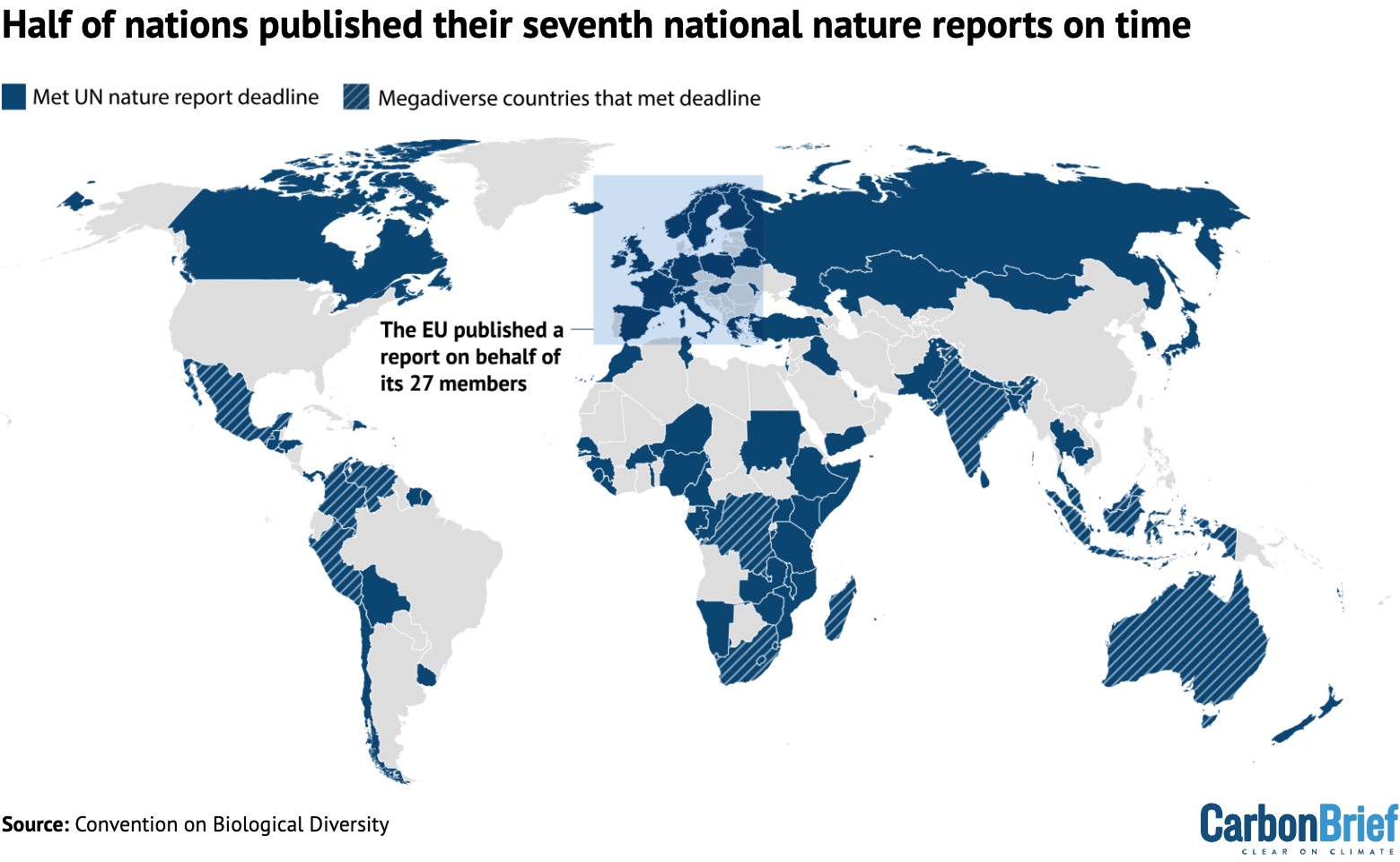Research on climate change in urban areas is skewed towards large, well-established cities in the global north, according to analysis of more than 50,000 studies.
The research, published in Nature Cities, uses keyword searching and machine-learning methods to produce a database of studies on climate change and cities published over 1990-2022.
The authors find that small, fast-growing cities – especially in Africa and Asia – are underrepresented in their database.
“While cities like London, New York and Berlin are extensively studied, fast-growing cities such as Goma (Democratic Republic of the Congo), Surat (India) and Huế (Vietnam) are barely visible in the literature,” one study author tells Carbon Brief.
Inhabitants of these cities have collectively contributed very little to global greenhouse gas emissions, but face the greatest impacts from the warming planet, the authors say.
The paper finds that literature on climate change and cities is growing “exponentially”, with 84% of studies on this topic published over 2012-22.
The new analysis is published as scientists from around the world start work on the Intergovernmental Panel on Climate Change (IPCC) special report on climate change and cities, which is due for publication in March 2027.
The study finds that, in its most recent set of headline reports, the IPCC captured “only” 5% of the total available literature on climate change and cities.
One study author tells Carbon Brief that the study is a “call to action” for the IPCC and broader research community “to synthesise more, to look beyond familiar places and to take seriously the diversity of urban realities that will define the future of climate mitigation and adaptation”.
Climate change and cities
More than half of the world’s population live in cities. These densely populated areas are responsible for the majority of global emissions and are also hotspots for climate extremes, including heatwaves and flooding.
Research about climate change and cities is a fast-growing field that encompasses, among other topics, the impacts of climate change on city infrastructure, adaptation measures that city-dwellers are taking and technological measures to limit emissions from cities.
The IPCC’s upcoming assessment report will feature its biggest overview of research on cities to date, as the organisation has commissioned a special report on climate change and cities as part of its upcoming assessment cycle. The report’s outline has already been agreed and the final document is scheduled for publication in March 2027.
However, the new study argues that, without a dedicated effort to “pre-aggregate the underlying literature by the entire research community”, the IPCC “may struggle to deliver a balanced and comprehensive review”.
The new analysis is the “first global stocktake of literature” on climate change and cities, according to a press release from the University of Sussex. The research was produced in-part to help advise the authors of the IPCC report about the current landscape of literature on climate change and cities, the study authors tell Carbon Brief.
Author Dr Tim Repke is a researcher at the Potsdam Institute for Climate Impact Research. He tells Carbon Brief that he hopes that the new study “can serve as a starting point of searchable, clean data” to help the authors of the upcoming IPCC special report to “do their work more efficiently”.
A growing field
The amount of literature on climate change in cities is “much larger than previously estimated”, the paper says.
Moreover, the analysis points to “rapid, exponential growth” in literature on climate change and cities over the past three decades.
The graph below shows the number of studies about climate change and cities published each year over 1990-2022 (dark blue) and the subset of studies that focus on specific city case studies (light blue).
The plot also shows how many studies were published during the writing periods of each IPCC assessment report. For example, 37,539 studies on climate change and cities were published in time to feature in the IPCC’s sixth assessment cycle (AR6).

The authors find that 84% of studies in their database were published over 2012-22.
Literature on climate change and cities is currently growing 4.5 times faster than literature on climate change alone, they add.
Dr Simon Montfort is a postdoctoral researcher at Switzerland’s École Polytechnique Fédérale de Lausanne and lead author of the study. He tells Carbon Brief that the rapid growth in literature on climate change and cities is “not really surprising” because population growth in cities means that these areas are “becoming more and more important”.
The data can be explored further in their interactive online tool.
Uneven focus
There is a well-established skew in climate change literature towards wealthy nations in the global north. The new study finds that this skew is highly evident in literature on climate change and cities.
The map below shows the locations of the 20,000 “case study” papers. Darker colours indicate more highly researched areas. The map shows cities that were researched in one study (pink), between one and five studies (orange) and in more than five studies (red). The graph in the bottom left shows this information broken down by continent.

The authors identify more than 4,000 studies in Europe and 3,000 in North America. According to the authors, half of cities in these continents are covered by more than one study.
However, the map reveals a lack of research focused on cities in central and South America, Africa, the Middle East and south and south-east Asia.
The authors identify more than 8,900 studies focused on cities in Asia. One-third of these focus on Chinese cities, they find. The authors identify more than 1,500 studies on Beijing alone, most of which focus on mitigation, rather than impacts or adaptation.
Meanwhile, they find that 92% of cities in Africa are researched in no more than one study. Nigeria is the most highly studied country on the continent, with almost 400 studies – half of which focus on Lagos.
The authors identify a bias in their research database towards large cities with high emissions. Meanwhile, they find that small, fast-growing, non-coastal cities are underrepresented in the literature.
Prof Felix Creuztig is the head of the working group on cities at the Potsdam Institute for Climate Impact Research. He is an author on the study and on the upcoming IPCC special report.
He tells Carbon Brief:
“While cities like London, New York and Berlin are extensively studied, fast-growing cities such as Goma, Surat and Huế are barely visible in the literature. These smaller and rapidly urbanising cities in Africa and Asia are precisely where climate risks and emissions are increasing fastest, yet they are strikingly underrepresented.”
50,000 studies
To identify all existing literature on climate change and cities, the authors conducted their search using the open-access research database OpenAlex.
They first used a long list of keywords to search the abstracts of every paper on OpenAlex for research focused on cities and climate change. Keywords for literature on cities included “urban” and “built-up”, while key words for climate change ranged from “changing climate” to “carbon taxes”.
They then checked these papers using a “machine learning classifier”, which filtered out any research that was unsuitable.
The authors used a machine-learning approach to scan the abstracts of studies in their database, to determine which topics are most frequently covered.
More than half of the papers in the database were focused on mitigation, the authors found. The impacts of climate change on cities was covered in around 15,000 papers, and the rest covered adaptation and “cross-cutting” topics.
Lead author Montfort tells Carbon Brief that the database of 50,000 articles is “quite a precise sample, meaning that it includes few irrelevant articles”.
However, he adds that there may be “many relevant articles missing from our sample”. For example, the authors find that their database does not completely capture literature from the “physical sciences”, such as smart energy grids or radiative cooling methods.
Language is another notable bias, as the database only includes research published in English.
Dr Doan Quang Van is a researcher at Japan’s University of Tsukuba and a lead author on the upcoming special report. He praises the study, but notes that the English-only database likely leads to an “underappreciation of non-English regions”.
He also notes that Indigenous knowledge, which is “not necessarily contained in ‘official documents’ like papers or reports” is not included in the database.
IPCC recommendations
The authors compare the tens of thousands of studies cited by the IPCC in its most recent assessment cycle – AR6 – to their own database of literature on cities and climate change. They estimate that the IPCC cited almost 2,500 studies from the database in AR6, representing around 5% of the total.
They find that the IPCC’s choices about which studies to include further deepens the skew towards “large and mega cities” in the global north that is already evident in the literature.
Lead author Montfort tells Carbon Brief that the case studies are a “rich-evidence base” of “nuanced, case-specific knowledge”.
He says that it is important to expand the evidence base to less well-studied cities, but acknowledges it is “highly infeasible to conduct a study for every single city”. As such, he suggests that researchers should “look for ways to generalise findings from the more than 20,000 city-specific case studies already available”. He adds:
“If cities can learn from each other’s experiences, the existing evidence could go much further in informing city practitioners.”
To do this, the authors suggest that scientists should develop a data-driven method of grouping cities based on size, location and language, to enable “cross-city transfer learning from successful climate solutions”.
Dr Tamara Janes is a member of the climate information for international development team at the UK Met Office and an author on the upcoming IPCC special report. She was not involved in the new research.
She tells Carbon Brief that the study is “useful and timely”, adding that it “will undoubtedly help the ongoing special report by providing a solid foundational understanding for the current state of urban research worldwide”.
Janes adds that “this type of study is not only useful for researchers to design their research questions, but also for donor agencies as gaps in research can then be prioritised through flexible funding initiatives”.
Study author Crueztig says:
“For the IPCC and the broader research community, this is a call to action: to synthesise more, to look beyond familiar places and to take seriously the diversity of urban realities that will define the future of climate mitigation and adaptation.”
IPCC working group two co-chair, Dr Winston Chow, tells Carbon Brief that the “voluminous literature on climate change today presents challenges in its assessment”. He adds:
“Our experts are aware of these challenges towards developing reliable findings in informing our assessments and the IPCC is formally discussing this issue in a forthcoming expert workshop on methods of assessment.”
The authors add that they hope their interactive map, which is available online, will update automatically in the future to provide a “searchable, interactive, living database” of literature on climate change and cities.
The post Fast-growing, global-south cities are ‘strikingly underrepresented’ in climate research appeared first on Carbon Brief.
Fast-growing, global-south cities are ‘strikingly underrepresented’ in climate research
Climate Change
Environmental Groups Challenge Air Permit for Natural Gas Expansion at Atlanta Plant
The Sierra Club and Southern Environmental Law Center are suing over state regulators’ approval of new gas turbines at Plant Bowen, citing concerns about worsening air quality.
Atlanta has spent decades battling smog and air pollution. Now, state regulators have cleared the way for a major natural gas expansion at Georgia Power’s Plant Bowen, a massive coal-fired power plant roughly 40 miles northwest of downtown that could add hundreds of tons of new air pollution each year to a region already struggling with unhealthy air.
Environmental Groups Challenge Air Permit for Natural Gas Expansion at Atlanta Plant
Climate Change
War in Iran Could Have ‘Historic’ Disruptions on Energy Markets
Oil prices jumped after the United States and Israel attacked Iran. Experts say the effects on oil and gas prices will depend on how long the war lasts and whether Iran damages energy infrastructure.
The U.S. and Israeli war against Iran is disrupting energy markets and driving oil and gas prices higher in the United States and globally. While those increases are modest so far, experts say the war has the potential to cause more severe and lasting impacts if Iran damages the region’s energy infrastructure or restricts shipping through the Strait of Hormuz.
War in Iran Could Have ‘Historic’ Disruptions on Energy Markets
Climate Change
Analysis: Half of nations meet UN deadline for nature-loss reporting
Half of nations have met a UN deadline to report on how they are tackling nature loss within their borders, Carbon Brief analysis shows.
This includes 11 of the 17 “megadiverse nations”, countries that account for 70% of Earth’s biodiversity.
It also includes all of the G7 nations apart from the US, which is not part of the world’s nature treaty.
All 196 countries that are part of the UN biodiversity treaty were due to submit their seventh “national reports” by 28 February, of which 98 have done so.
Their submissions are supposed to provide key information for an upcoming global report on actions to halt and reverse biodiversity loss by 2030, in addition to a global review of progress due to be conducted by countries at the COP17 nature summit in Armenia in October this year.
At biodiversity talks in Rome in February, UN officials said that national reports submitted late will not be included in the global report due to a lack of time, but could still be considered in the global review.
Tracking nature action
In 2022, nations signed a landmark deal to halt and reverse nature loss by 2030, known as the “Kunming-Montreal Global Biodiversity Framework” (GBF).
In an effort to make sure countries take action at the domestic level, the GBF included an “implementation schedule”, involving the publishing of new national plans in 2024 and new national reports in 2026.
The two sets of documents were to inform both a global report and a global review, to be conducted by countries at COP17 in Armenia later this year. (This schedule mirrors the one set out for tackling climate change under the Paris Agreement.)
The deadline for nations’ seventh national reports, which contain information on their progress towards meeting the 23 targets of the GBF based on a set of key indicators, was 28 February 2026.
According to Carbon Brief’s analysis of the UN Convention on Biological Diversity’s online reporting platform, 98 out of the 196 countries that are part of the nature convention (50%) submitted on time.
The map below shows countries that submitted their seventh national reports by the UN’s deadline.

This includes 11 of the 17 “megadiverse nations” that account for 70% of Earth’s biodiversity.
The megadiverse nations to meet the deadline were India, Venezuela, Indonesia, Madagascar, Peru, Malaysia, South Africa, Colombia, Mexico, the Democratic Republic of the Congo and Australia.
It also includes all of the G7 nations (France, Germany, the UK, Japan, Italy and Canada), excluding the US, which has never ratified the Convention on Biological Diversity.
The UK’s seventh national report shows that it is currently on track to meet just three of the GBF’s 23 targets.
This is according to a LinkedIn post from Dr David Cooper, former executive secretary of the CBD and current chair of the UK’s Joint Nature Conservation Committee, which coordinated the UK’s seventh national report,
The report shows the UK is not on track to meet one of the headline targets of the GBF, which is to protect 30% of land and sea for nature by 2030.
It reports that the proportion of land protected for nature is 7% in England, 18% in Scotland and 9% in Northern Ireland. (The figure is not given for Wales.)
National plans
In addition to the national reports, the upcoming global report and review will draw on countries’ national plans.
Countries were meant to have submitted their new national plans, known as “national biodiversity strategies and action plans” (NBSAPs), by the start of COP16 in October 2024.
A joint investigation by Carbon Brief and the Guardian found that only 15% of member countries met that deadline.
Since then, the percentage of countries that have submitted a new NBSAP has risen to 39%.
According to the GBF and its underlying documents, countries that were “not in a position” to meet the deadline to submit NBSAPs ahead of COP16 were requested to instead submit national targets. These submissions simply list biodiversity targets that countries will aim for, without an accompanying plan for how they will be achieved.
As of 2 March, 78% of nations had submitted national targets.
At biodiversity talks in Rome in February, UN officials said that national reports submitted late will not be included in the global report due to a lack of time, but could still be considered in the global review.
Funding ‘delays’
At the Rome talks, some countries raised that they had faced “difficulties in submitting [their national reports] on time”, according to the Earth Negotiations Bulletin.
Speaking on behalf of “many” countries, Fiji said that there had been “technical and financial constraints faced by parties” in the preparation of their seventh national reports.
In a statement to Carbon Brief, a spokesperson for the Global Environment Facility, the body in charge of providing financial and technical assistance to countries for the preparation of their national reports, said “delays in fund disbursement have occurred in some cases”, adding:
“In 2023, the GEF council approved support for the development of NBSAPs and the seventh national reports for all 139 eligible countries that requested assistance. This includes national grants of up to $450,000 per country and $6m in global technical assistance delivered through the UN Development Programme and UN Environment Programme.
“As of the end of January 2026, all 139 participating countries had benefited from technical assistance and 93% had accessed their national grants, with 11 countries yet to receive their funds. Delays in fund disbursement have occurred in some cases, compounded by procurement challenges and limited availability of technical expertise.”
The spokesperson added that the fund will “continue to engage closely with agencies and countries to support timely completion of NBSAPs and the seventh national reports”.
The post Analysis: Half of nations meet UN deadline for nature-loss reporting appeared first on Carbon Brief.
Analysis: Half of nations meet UN deadline for nature-loss reporting
-
Greenhouse Gases7 months ago
Guest post: Why China is still building new coal – and when it might stop
-
Climate Change7 months ago
Guest post: Why China is still building new coal – and when it might stop
-

 Greenhouse Gases2 years ago
Greenhouse Gases2 years ago嘉宾来稿:满足中国增长的用电需求 光伏加储能“比新建煤电更实惠”
-
Climate Change2 years ago
Bill Discounting Climate Change in Florida’s Energy Policy Awaits DeSantis’ Approval
-
Climate Change2 years ago
Spanish-language misinformation on renewable energy spreads online, report shows
-

 Climate Change2 years ago
Climate Change2 years ago嘉宾来稿:满足中国增长的用电需求 光伏加储能“比新建煤电更实惠”
-
Climate Change Videos2 years ago
The toxic gas flares fuelling Nigeria’s climate change – BBC News
-

 Carbon Footprint2 years ago
Carbon Footprint2 years agoUS SEC’s Climate Disclosure Rules Spur Renewed Interest in Carbon Credits











